英语小课题立项申请书
英语学习活动观课题立项申请书

英语学习活动观课题立项申请书Dear committee members,I am writing to submit a proposal for an English learning activity observation project. As an English teacher, I have observed a growing need for innovative and effective teaching methods to engage students in the learning process. This project aims to observe and analyze various English learning activities to identify best practices and areas for improvement.First and foremost, the goal of this project is to observe a wide range of English learning activities in different educational settings, such as primary schools, secondary schools, and language institutes. By doing so, we hope to gain a comprehensive understanding of the current practices and challenges in English language education. Through these observations, we aim to identify effective teaching strategies, classroom management techniques, and student engagement methods that can be applied in variouslearning environments.In addition, this project will focus on the role of technology in English language learning. With the advancement of technology, there are now numerous digital tools and resources available for language education. We plan to observe how these tools are integrated into English learning activities and their impact on student learning outcomes. By examining the use of technology in English classrooms, we hope to gain insights into the mosteffective ways to leverage digital resources for language education.Furthermore, we are interested in exploring the impact of cultural diversity on English language learning. As English is a global language, it is crucial to consider the cultural backgrounds and experiences of students in the learning process. We will observe how cultural diversity is addressed in English learning activities and how it affects student participation and understanding. By doing so, we aim to identify inclusive teaching practices that can accommodate diverse cultural perspectives and enhance thelearning experience for all students.Moreover, this project will also examine the effectiveness of collaborative learning in English language education. Collaborative learning has been shown to foster critical thinking, communication skills, and intercultural competence. We plan to observe how collaborative learningis implemented in English classrooms and its impact on student engagement and language acquisition. Through these observations, we aim to identify best practices for promoting collaborative learning in English language education.In conclusion, this project seeks to provide valuable insights into the current practices and challenges in English language education. By observing a wide range of English learning activities, we aim to identify effective teaching strategies, the role of technology, cultural diversity, and collaborative learning in language education. We believe that the findings from this project will contribute to the improvement of English language teaching and learning practices. Thank you for considering ourproposal, and we look forward to the opportunity to conduct this observation project.。
小学英语课题申请书模板
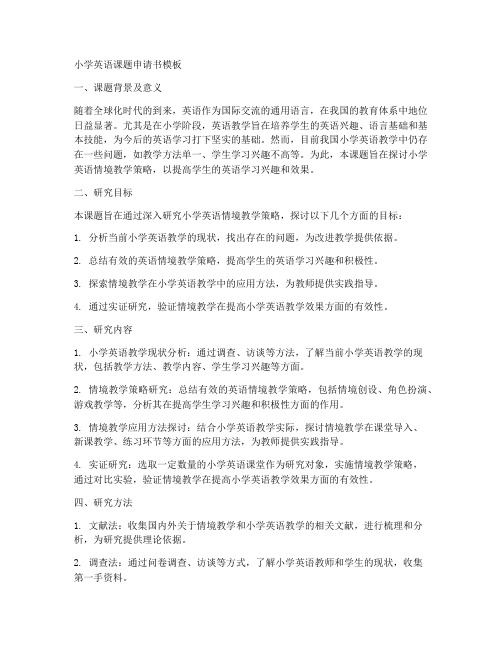
小学英语课题申请书模板一、课题背景及意义随着全球化时代的到来,英语作为国际交流的通用语言,在我国的教育体系中地位日益显著。
尤其是在小学阶段,英语教学旨在培养学生的英语兴趣、语言基础和基本技能,为今后的英语学习打下坚实的基础。
然而,目前我国小学英语教学中仍存在一些问题,如教学方法单一、学生学习兴趣不高等。
为此,本课题旨在探讨小学英语情境教学策略,以提高学生的英语学习兴趣和效果。
二、研究目标本课题旨在通过深入研究小学英语情境教学策略,探讨以下几个方面的目标:1. 分析当前小学英语教学的现状,找出存在的问题,为改进教学提供依据。
2. 总结有效的英语情境教学策略,提高学生的英语学习兴趣和积极性。
3. 探索情境教学在小学英语教学中的应用方法,为教师提供实践指导。
4. 通过实证研究,验证情境教学在提高小学英语教学效果方面的有效性。
三、研究内容1. 小学英语教学现状分析:通过调查、访谈等方法,了解当前小学英语教学的现状,包括教学方法、教学内容、学生学习兴趣等方面。
2. 情境教学策略研究:总结有效的英语情境教学策略,包括情境创设、角色扮演、游戏教学等,分析其在提高学生学习兴趣和积极性方面的作用。
3. 情境教学应用方法探讨:结合小学英语教学实际,探讨情境教学在课堂导入、新课教学、练习环节等方面的应用方法,为教师提供实践指导。
4. 实证研究:选取一定数量的小学英语课堂作为研究对象,实施情境教学策略,通过对比实验,验证情境教学在提高小学英语教学效果方面的有效性。
四、研究方法1. 文献法:收集国内外关于情境教学和小学英语教学的相关文献,进行梳理和分析,为研究提供理论依据。
2. 调查法:通过问卷调查、访谈等方式,了解小学英语教师和学生的现状,收集第一手资料。
3. 实证研究法:在实际教学中运用情境教学策略,通过对比实验,观察和记录学生的学习情况,分析情境教学的效果。
4. 案例分析法:挑选具有代表性的小学英语情境教学案例,进行深入剖析,总结经验教训。
英语课题立项申请书
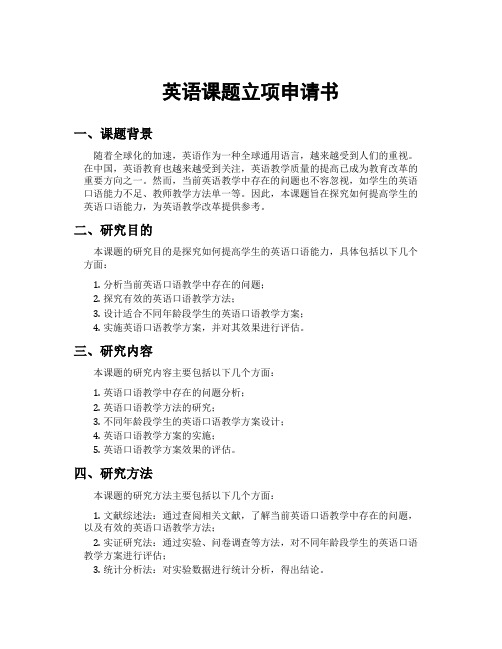
英语课题立项申请书一、课题背景随着全球化的加速,英语作为一种全球通用语言,越来越受到人们的重视。
在中国,英语教育也越来越受到关注,英语教学质量的提高已成为教育改革的重要方向之一。
然而,当前英语教学中存在的问题也不容忽视,如学生的英语口语能力不足、教师教学方法单一等。
因此,本课题旨在探究如何提高学生的英语口语能力,为英语教学改革提供参考。
二、研究目的本课题的研究目的是探究如何提高学生的英语口语能力,具体包括以下几个方面:1.分析当前英语口语教学中存在的问题;2.探究有效的英语口语教学方法;3.设计适合不同年龄段学生的英语口语教学方案;4.实施英语口语教学方案,并对其效果进行评估。
三、研究内容本课题的研究内容主要包括以下几个方面:1.英语口语教学中存在的问题分析;2.英语口语教学方法的研究;3.不同年龄段学生的英语口语教学方案设计;4.英语口语教学方案的实施;5.英语口语教学方案效果的评估。
四、研究方法本课题的研究方法主要包括以下几个方面:1.文献综述法:通过查阅相关文献,了解当前英语口语教学中存在的问题,以及有效的英语口语教学方法;2.实证研究法:通过实验、问卷调查等方法,对不同年龄段学生的英语口语教学方案进行评估;3.统计分析法:对实验数据进行统计分析,得出结论。
五、预期成果本课题的预期成果主要包括以下几个方面:1.发表学术论文:将研究结果发表在相关学术期刊上,为英语教学改革提供参考;2.编写教材:根据研究结果,编写适合不同年龄段学生的英语口语教材;3.推广应用:将研究结果应用于实际教学中,提高学生的英语口语能力。
六、研究计划本课题的研究计划如下:时间研究内容第一年1. 文献综述;2. 英语口语教学方法研究;3. 不同年龄段学生的英语口语教学方案设计第二年1. 英语口语教学方案实施;2. 实验数据收集与分析第三年1. 实验数据分析;2. 结果总结与论文撰写;3. 教材编写七、研究团队本课题的研究团队由以下人员组成:1.课题负责人:XXX,教授,从事英语教学研究多年,具有丰富的教学经验;2.研究人员:XXX,博士生,研究方向为英语教育;3.研究人员:XXX,硕士生,研究方向为英语教育。
英语课题立项申请书范文

英语课题立项申请书范文Proposal for English Curriculum Development Project.1. Project Overview.Project Title: Enhancing English Language Skills Through Immersive Learning Experiences.Project Duration: One academic year (two semesters)。
Target Group: Secondary school students aged 13-16。
Project Aims:1. To improve students' English language proficiency through practical and immersive learning experiences.2. To enhance students' cultural understanding and intercultural communication skills.3. To foster a positive attitude towards language learning and global engagement.2. Project Background.In today's interconnected world, proficiency in English has become a crucial skill for personal and professional success. However, traditional teaching methods often fail to engage students, resulting in a disconnect between learning and real-world applications. This project aims to bridge this gap by incorporating immersive learning experiences into the English curriculum.3. Project Objectives.To design and implement an immersive learning program that integrates English language learning with real-world contexts.To create a curriculum that encourages active participation and collaboration among students.To evaluate the effectiveness of the program through regular assessments and feedback mechanisms.4. Methodology.Curriculum Design:+ Incorporate themes such as global issues, cross-cultural communication, and technology into lesson plans.+ Develop interactive activities and role-plays to simulate real-world scenarios.+ Utilize multimedia resources and technology tools to enhance learning.Immersive Learning Experiences:+ Arrange visits to local businesses and organizations to provide practical language use opportunities.+ Collaborate with other schools or educational institutions to create an international student exchange program.+ Encourage participation in language-related competitions and workshops.Assessment and Feedback:+ Regularly assess students' progress through written assignments, oral presentations, and group projects.+ Collect feedback from students, teachers, and parents to improve the program.5. Expected Outcomes.Significant improvement in students' English proficiency levels.Enhanced cultural awareness and intercultural communication skills.Increased motivation and engagement in language learning.Development of a positive attitude towards global engagement and cross-cultural understanding.6. Resources Required.Funding for program implementation and materials.Access to local businesses and organizations for immersion experiences.Technology tools and multimedia resources for enhanced learning.Collaboration with other schools or educational institutions for exchange programs.7. Implementation Plan.Phase 1 (Month 1-2): Curriculum design and planning.Phase 2 (Month 3-6): Implementation of the immersive learning program.Phase 3 (Month 7-8): Mid-term assessment and feedback collection.Phase 4 (Month 9-12): Continuation of the program with adjustments based on feedback.Phase 5 (End of Year): Final assessment and evaluation of the program's effectiveness.8. Conclusion.By implementing this English curriculum development project, we aim to transform traditional language learning into an engaging and meaningful experience for students. Through immersive learning opportunities, students will not only improve their English proficiency but also gain valuable cross-cultural insights and global perspectives.We believe that this approach will foster a generation of young learners who are not only proficient in English but also passionate about global engagement and cultural exchange.。
英语课题立项申请书
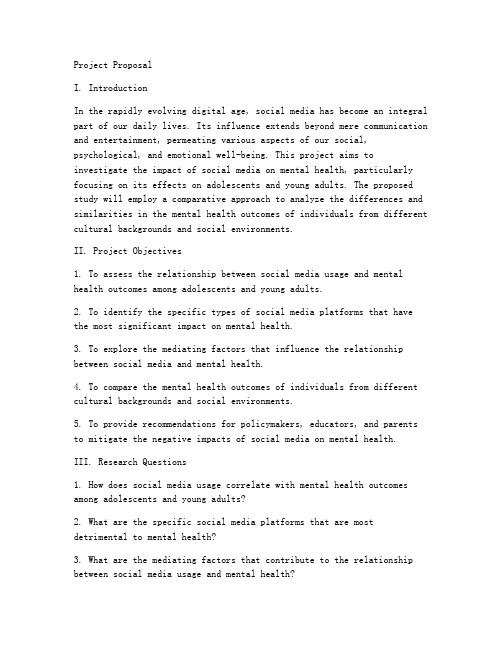
Project ProposalI. IntroductionIn the rapidly evolving digital age, social media has become an integral part of our daily lives. Its influence extends beyond mere communication and entertainment, permeating various aspects of our social, psychological, and emotional well-being. This project aims toinvestigate the impact of social media on mental health, particularly focusing on its effects on adolescents and young adults. The proposed study will employ a comparative approach to analyze the differences and similarities in the mental health outcomes of individuals from different cultural backgrounds and social environments.II. Project Objectives1. To assess the relationship between social media usage and mental health outcomes among adolescents and young adults.2. To identify the specific types of social media platforms that have the most significant impact on mental health.3. To explore the mediating factors that influence the relationship between social media and mental health.4. To compare the mental health outcomes of individuals from different cultural backgrounds and social environments.5. To provide recommendations for policymakers, educators, and parents to mitigate the negative impacts of social media on mental health.III. Research Questions1. How does social media usage correlate with mental health outcomes among adolescents and young adults?2. What are the specific social media platforms that are most detrimental to mental health?3. What are the mediating factors that contribute to the relationship between social media usage and mental health?4. Are there significant differences in mental health outcomes between individuals from different cultural backgrounds and social environments?5. What strategies can be implemented to promote healthier social media usage and improve mental health?IV. MethodologyThis project will employ a mixed-methods approach, combiningquantitative and qualitative research methods to gather comprehensive data. The following methodology will be used:1. Literature Review: An extensive review of existing literature on the impact of social media on mental health will be conducted to identify gaps in current research and to establish a theoretical framework for the proposed study.2. Quantitative Data Collection: A survey will be designed to collect data on social media usage patterns, mental health outcomes, and demographic information from a sample of adolescents and young adults. The survey will be distributed through various online platforms and social media channels to ensure a diverse and representative sample.3. Qualitative Data Collection: In-depth interviews will be conducted with a subset of the survey participants to gain insights into their personal experiences with social media and its impact on their mental health.4. Data Analysis: Quantitative data will be analyzed using statistical software (e.g., SPSS) to identify correlations and trends. Qualitative data will be analyzed using thematic analysis to identify common themes and patterns.V. Expected OutcomesThe proposed study is expected to yield several significant outcomes:1. A better understanding of the relationship between social media usage and mental health outcomes among adolescents and young adults.2. Identification of specific social media platforms that pose a greater risk to mental health.3. Insights into the mediating factors that influence the relationship between social media and mental health.4. Comparative analysis of mental health outcomes across different cultural backgrounds and social environments.5. Recommendations for policymakers, educators, and parents to promote healthier social media usage and improve mental health.VI. BudgetThe budget for this project is estimated to be $50,000, which will cover the following expenses:1. Survey design and distribution: $10,0002. Data analysis software: $5,0003. In-depth interviews: $10,0004. Research assistants: $10,0005. Contingency funds: $5,000VII. ConclusionThis project is designed to shed light on the complex relationship between social media usage and mental health. By exploring this relationship through a comparative lens, we aim to contribute valuable insights to the ongoing discussion on how to mitigate the negative impacts of。
初中英语课题立项申请书
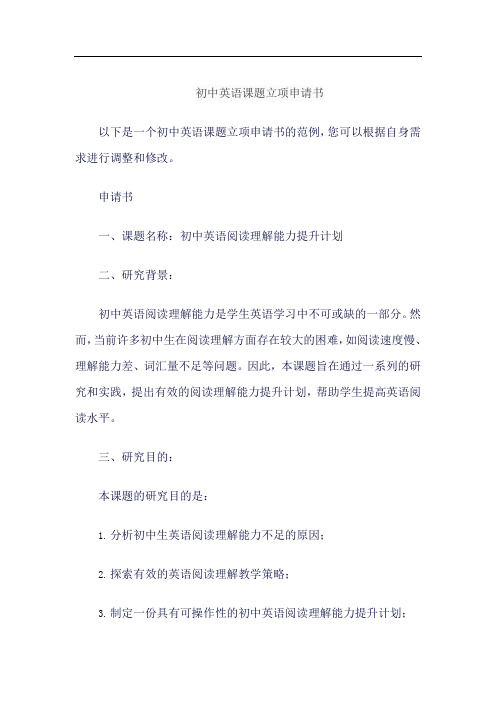
初中英语课题立项申请书
以下是一个初中英语课题立项申请书的范例,您可以根据自身需求进行调整和修改。
申请书
一、课题名称:初中英语阅读理解能力提升计划
二、研究背景:
初中英语阅读理解能力是学生英语学习中不可或缺的一部分。
然而,当前许多初中生在阅读理解方面存在较大的困难,如阅读速度慢、理解能力差、词汇量不足等问题。
因此,本课题旨在通过一系列的研究和实践,提出有效的阅读理解能力提升计划,帮助学生提高英语阅读水平。
三、研究目的:
本课题的研究目的是:
1.分析初中生英语阅读理解能力不足的原因;
2.探索有效的英语阅读理解教学策略;
3.制定一份具有可操作性的初中英语阅读理解能力提升计划;
4.通过实践验证提升计划的可行性和效果。
四、研究方法:
本课题将采用以下研究方法:
1.文献综述:收集与英语阅读理解能力相关的文献资料,了解现有的研究成果和不足之处;
2.调查问卷:对初中生进行英语阅读理解能力的调查,了解学生在阅读理解方面的困难和需求;
3.教学实践:在实践中探索有效的英语阅读理解教学策略,并不断改进提升计划;
4.对比分析:对比实施提升计划前后的学生英语阅读理解成绩,分析提升计划的效果。
五、预期成果:
本课题的预期成果包括:
1.完成一份详细的初中英语阅读理解能力提升计划;
2.通过实践验证提升计划的可行性和效果,为学生提供有效的阅读理解学习指导;
3.为初中英语教师提供实用的教学策略和建议,提高英语阅读理解教学质量;
4.为相关教育部门和科研机构提供有价值的参考数据和研究资料。
英语词汇教校本课题立项申请书
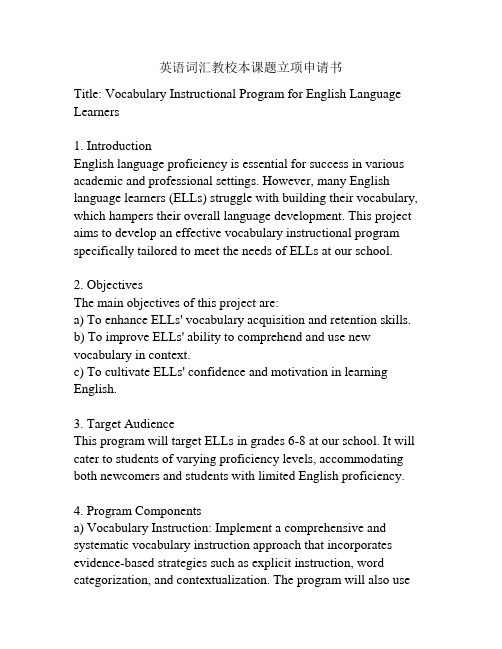
英语词汇教校本课题立项申请书Title: Vocabulary Instructional Program for English Language Learners1. IntroductionEnglish language proficiency is essential for success in various academic and professional settings. However, many English language learners (ELLs) struggle with building their vocabulary, which hampers their overall language development. This project aims to develop an effective vocabulary instructional program specifically tailored to meet the needs of ELLs at our school.2. ObjectivesThe main objectives of this project are:a) To enhance ELLs' vocabulary acquisition and retention skills.b) To improve ELLs' ability to comprehend and use new vocabulary in context.c) To cultivate ELLs' confidence and motivation in learning English.3. Target AudienceThis program will target ELLs in grades 6-8 at our school. It will cater to students of varying proficiency levels, accommodating both newcomers and students with limited English proficiency.4. Program Componentsa) Vocabulary Instruction: Implement a comprehensive and systematic vocabulary instruction approach that incorporates evidence-based strategies such as explicit instruction, word categorization, and contextualization. The program will also usemultimedia resources and technology to engage and reinforce vocabulary learning.b) Vocabulary Practice: Provide regular opportunities for students to practice and apply newly acquired vocabulary through interactive exercises, games, and real-life contexts.c) Vocabulary Assessment: Develop formative and summative assessments to measure students' vocabulary growth and progress accurately.5. TimelineThe proposed timeline for this project is as follows:a) Program Development: Months 1-3b) Pilot Testing and Evaluation: Months 4-6c) Program Refinement: Months 7-8d) Full Implementation: Months 9-126. Evaluation PlanTo ensure the effectiveness of the program, the following evaluation methods will be employed:a) Pre and post-assessments to measure growth in vocabulary knowledge.b) Regular formative assessments to monitor individual student progress.c) Student and teacher feedback surveys to identify areas for improvement.7. Resources RequiredThe successful implementation of this project will require the following resources:a) Development and procurement of instructional materials andresources.b) Training and professional development for teachers to deliver the program effectively.c) Access to technology and multimedia resources.d) Evaluation tools and data collection instruments.8. BudgetAn estimated budget breakdown for this project is as follows:- Instructional materials and resources: $X- Teacher training and professional development: $X- Technology and multimedia resources: $X- Evaluation tools and data collection instruments: $X- Contingency: $X9. ConclusionBy implementing an effective vocabulary instructional program for ELLs, we aim to empower our students with the necessary language skills to succeed academically and socially. This project will foster a supportive learning environment, enabling ELLs to build their vocabulary, improve English language proficiency, and ultimately achieve long-term success.。
教师英语课题立项申请书
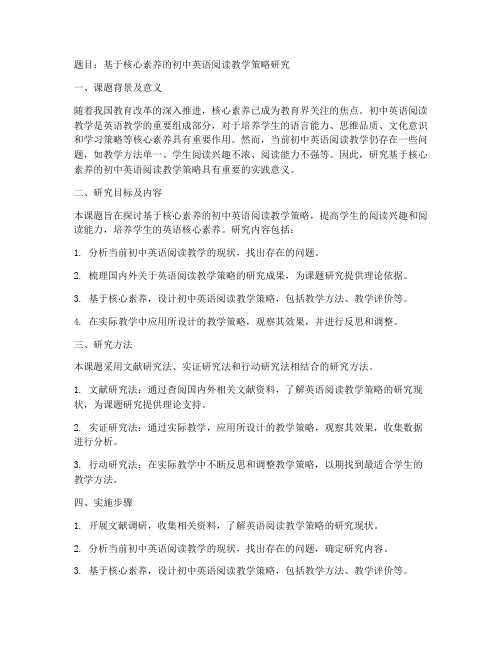
题目:基于核心素养的初中英语阅读教学策略研究一、课题背景及意义随着我国教育改革的深入推进,核心素养已成为教育界关注的焦点。
初中英语阅读教学是英语教学的重要组成部分,对于培养学生的语言能力、思维品质、文化意识和学习策略等核心素养具有重要作用。
然而,当前初中英语阅读教学仍存在一些问题,如教学方法单一、学生阅读兴趣不浓、阅读能力不强等。
因此,研究基于核心素养的初中英语阅读教学策略具有重要的实践意义。
二、研究目标及内容本课题旨在探讨基于核心素养的初中英语阅读教学策略,提高学生的阅读兴趣和阅读能力,培养学生的英语核心素养。
研究内容包括:1. 分析当前初中英语阅读教学的现状,找出存在的问题。
2. 梳理国内外关于英语阅读教学策略的研究成果,为课题研究提供理论依据。
3. 基于核心素养,设计初中英语阅读教学策略,包括教学方法、教学评价等。
4. 在实际教学中应用所设计的教学策略,观察其效果,并进行反思和调整。
三、研究方法本课题采用文献研究法、实证研究法和行动研究法相结合的研究方法。
1. 文献研究法:通过查阅国内外相关文献资料,了解英语阅读教学策略的研究现状,为课题研究提供理论支持。
2. 实证研究法:通过实际教学,应用所设计的教学策略,观察其效果,收集数据进行分析。
3. 行动研究法:在实际教学中不断反思和调整教学策略,以期找到最适合学生的教学方法。
四、实施步骤1. 开展文献调研,收集相关资料,了解英语阅读教学策略的研究现状。
2. 分析当前初中英语阅读教学的现状,找出存在的问题,确定研究内容。
3. 基于核心素养,设计初中英语阅读教学策略,包括教学方法、教学评价等。
4. 在实际教学中应用所设计的教学策略,观察其效果,并进行反思和调整。
5. 总结研究成果,撰写课题研究报告。
五、预期成果通过本课题的研究,预期达到以下成果:1. 分析当前初中英语阅读教学的现状,找出存在的问题,为后续教学改革提供依据。
2. 基于核心素养,设计出适合初中英语阅读教学的有效策略,提高学生的阅读兴趣和阅读能力。
中学英语立项申请书模板
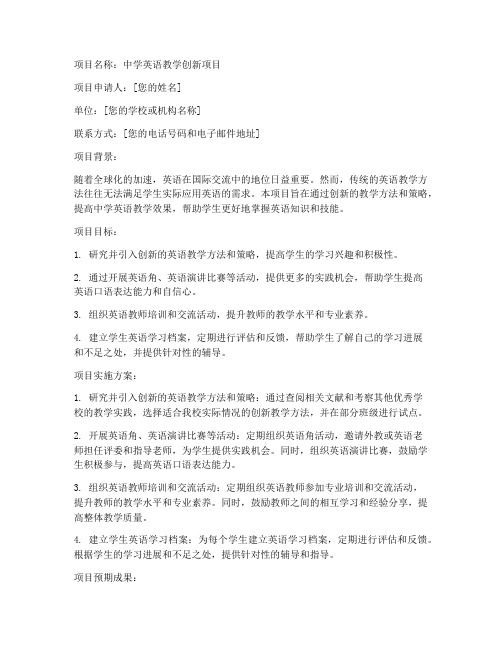
项目名称:中学英语教学创新项目项目申请人:[您的姓名]单位:[您的学校或机构名称]联系方式:[您的电话号码和电子邮件地址]项目背景:随着全球化的加速,英语在国际交流中的地位日益重要。
然而,传统的英语教学方法往往无法满足学生实际应用英语的需求。
本项目旨在通过创新的教学方法和策略,提高中学英语教学效果,帮助学生更好地掌握英语知识和技能。
项目目标:1. 研究并引入创新的英语教学方法和策略,提高学生的学习兴趣和积极性。
2. 通过开展英语角、英语演讲比赛等活动,提供更多的实践机会,帮助学生提高英语口语表达能力和自信心。
3. 组织英语教师培训和交流活动,提升教师的教学水平和专业素养。
4. 建立学生英语学习档案,定期进行评估和反馈,帮助学生了解自己的学习进展和不足之处,并提供针对性的辅导。
项目实施方案:1. 研究并引入创新的英语教学方法和策略:通过查阅相关文献和考察其他优秀学校的教学实践,选择适合我校实际情况的创新教学方法,并在部分班级进行试点。
2. 开展英语角、英语演讲比赛等活动:定期组织英语角活动,邀请外教或英语老师担任评委和指导老师,为学生提供实践机会。
同时,组织英语演讲比赛,鼓励学生积极参与,提高英语口语表达能力。
3. 组织英语教师培训和交流活动:定期组织英语教师参加专业培训和交流活动,提升教师的教学水平和专业素养。
同时,鼓励教师之间的相互学习和经验分享,提高整体教学质量。
4. 建立学生英语学习档案:为每个学生建立英语学习档案,定期进行评估和反馈。
根据学生的学习进展和不足之处,提供针对性的辅导和指导。
项目预期成果:1. 学生的英语学习成绩明显提高,学习兴趣和积极性得到提升。
2. 学生的英语口语表达能力和自信心得到提高,能够更好地适应国际化竞争环境。
3. 英语教师的教学水平和专业素养得到提升,能够更好地满足学生的发展需求。
4. 学生英语学习档案的建立和完善,为学生的个性化学习和辅导提供有力支持。
项目预算:1. 教学设备和材料的购置:5000元2. 教师培训和交流活动的费用:8000元3. 学生活动的组织和实施费用:6000元4. 项目管理和评估费用:4000元总计:23000元申请单位意见:[请填写申请单位对项目的意见和批准情况]申请人签名:日期:[请填写申请日期]。
英语课题立项申请书怎么写范文

英语课题立项申请书怎么写范文您好,以下是一份关于英语课题立项申请书的范文:[您的姓名][您的职称/职位][所在学校/机构名称][所在城市/地区名称][联系电话][电子邮件地址][日期][项目审批部门名称][所在学校/机构名称][所在城市/地区名称]主题:英语课题立项申请书尊敬的[项目审批部门名称]:我谨以此函向贵部门提交一份英语课题立项申请,希望得到您的审批和支持。
一、项目背景与目标随着全球化和信息化的快速发展,英语已经成为一门备受重视的国际通用语言。
然而,在我国目前的英语教育中,存在着一系列问题,如学生的口语表达能力不足、学生对英语学习的兴趣不高等。
因此,本课题旨在探索一种有效的英语教学方法,提升学生的口语表达能力和学习兴趣。
具体目标如下:1. 通过创新的教学模式和活动设计,提高学生的口语交流能力;2. 激发学生学习英语的兴趣,培养他们的自主学习能力;3. 促进学生跨文化交流能力和跨学科学习能力的提升。
二、项目内容与方法本课题计划开展以下几项内容和方法:1. 设计并实施一系列针对口语表达的英语教学活动,如角色扮演、小组讨论等;2. 引入新颖的教学工具和技术,如在线学习平台、智能语音识别等;3. 结合文化和跨学科元素,设计有趣、实用的课程内容;4. 进行实地调研和访谈,了解学生对英语学习的需求和困难,以便根据实际情况进行调整和优化。
三、预期成果与效益通过本课题的开展,预期将取得以下成果和效益:1. 学生的口语表达能力将得到有效提升,取得更好的英语学习成绩;2. 学生对英语学习的兴趣将大幅提高,增强其自主学习动力;3. 学生的跨文化交流能力和跨学科学习能力得到锻炼和提升;4. 推广应用本课题成果,进一步推进英语教育改革与创新;5. 促进学校/机构的教育教学水平的提高,提升学校/机构的影响力和竞争力。
四、项目计划与预算本项目计划从[开始日期]开始,历时[预计时长],经费预算总计[预算金额]。
具体项目计划和预算细节,将在得到您的批准后进行详细编制和提交。
关于小学英语作业设计课题立项申请书
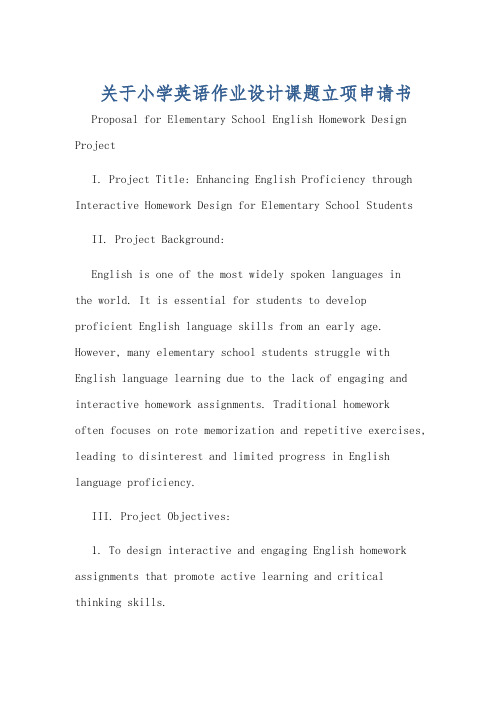
关于小学英语作业设计课题立项申请书Proposal for Elementary School English Homework Design ProjectI. Project Title: Enhancing English Proficiency through Interactive Homework Design for Elementary School Students II. Project Background:English is one of the most widely spoken languages inthe world. It is essential for students to developproficient English language skills from an early age. However, many elementary school students struggle with English language learning due to the lack of engaging and interactive homework assignments. Traditional homeworkoften focuses on rote memorization and repetitive exercises, leading to disinterest and limited progress in English language proficiency.III. Project Objectives:1. To design interactive and engaging English homework assignments that promote active learning and critical thinking skills.2. To enhance students' English language proficiency through the use of creative and interactive homework activities.3. To promote a positive attitude towards English language learning among elementary school students.IV. Project Design and Methodology:The project will involve the following key activities:1. Research and Analysis: Conducting a thorough reviewof current English homework assignments and identifying areas for improvement.2. Curriculum Alignment: Aligning the homework designwith the school's English language curriculum to ensure relevance and effectiveness.3. Interactive Activities: Designing a variety of interactive and engaging homework activities, such as games, role-plays, and creative writing tasks.4. Pilot Testing: Implementing the newly designed homework assignments with a small group of students to gather feedback and make necessary adjustments.5. Evaluation: Assessing the impact of the new homework design on students' English language proficiency andlearning outcomes.V. Expected Outcomes:1. Improved English Language Proficiency: Students will demonstrate increased proficiency in English languageskills, including reading, writing, listening, and speaking.2. Positive Attitude: Students will exhibit a more positive attitude towards English language learning,leading to higher motivation and engagement in the classroom.3. Enhanced Learning Experience: The new homework design will provide students with a more enjoyable and effective learning experience, contributing to their overall academic success.VI. Project Timeline:The project will be implemented over a period of 12 months, starting from September 2022 to August 2023. The timeline will include research and analysis, curriculumalignment, homework design, pilot testing, and evaluation phases.VII. Budget and Resources:The project will require funding for research materials, software for interactive activities, and training for teachers in implementing the new homework design. Additionally, the project will utilize existing school resources and facilities for pilot testing and evaluation.VIII. Conclusion:This project aims to address the current challenges in English language homework assignments for elementary school students. By designing interactive and engaging homework activities, we seek to enhance students' English language proficiency and promote a positive attitude towards language learning. We believe that this project will contribute to the overall academic success of students and provide a model for effective English language homework design in elementary schools.中文翻译:I. 项目标题:通过互动作业设计提高小学生英语水平II. 项目背景:英语是世界上使用最广泛的语言之一。
课题立项申请书英语教学

课题立项申请书英语教学Research Proposal on English Language Teaching.Abstract:The purpose of this research proposal is to investigate the effectiveness of learner-centered approaches in improving English language proficiency among secondary school students. The proposal outlines the research design, methodology, data collection, and analysis methods to be employed in the study.Background:English language teaching has been a fundamental aspect of education globally, with various methodologies emerging to meet the diverse needs of learners. Traditional teacher-centered approaches have long been prevalent in second language instruction, prioritizing content delivery and teacher authority. However, recent research advocates forlearner-centered approaches that empower students and promote active engagement in the learning process.Research Questions:1. To what extent do learner-centered approaches enhance English language proficiency in terms of speaking, listening, reading, and writing?2. What are the specific aspects of learner-centered approaches that contribute to improved language proficiency?Methodology:The study will adopt a quantitative research design using a quasi-experimental method. Participants will be randomly assigned to two groups: an experimental group implementing learner-centered approaches and a controlgroup following a traditional teacher-centered approach.Data collection will involve:1. Preand post-tests to measure changes in English language proficiency using standardized language assessments.2. Classroom observations to document the implementation of learner-centered approaches and student engagement.3. Student surveys to gather feedback and insights into their experiences with the different methodologies.Data Analysis:1. Statistical analysis to compare the language proficiency scores between the experimental and control groups.2. Qualitative analysis of classroom observation data and student surveys to identify the specific aspects of learner-centered approaches that contribute to enhanced language proficiency.Significance:This research will provide valuable insights into the effectiveness of learner-centered approaches in improving English language proficiency among secondary school students. The findings will help educators refine their pedagogical practices, fostering a more learner-centric educational environment that empowers students to actively engage in their language learning journey.中文回答:课题立项申请书,英语教学。
课题立项申请书英语教学
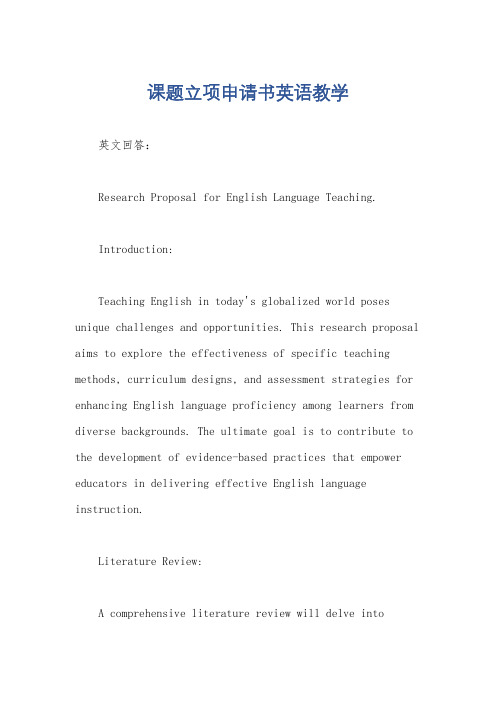
课题立项申请书英语教学英文回答:Research Proposal for English Language Teaching.Introduction:Teaching English in today's globalized world poses unique challenges and opportunities. This research proposal aims to explore the effectiveness of specific teaching methods, curriculum designs, and assessment strategies for enhancing English language proficiency among learners from diverse backgrounds. The ultimate goal is to contribute to the development of evidence-based practices that empower educators in delivering effective English language instruction.Literature Review:A comprehensive literature review will delve intoexisting research on the most effective approaches to English language teaching. This will include an examination of the cognitive, linguistic, and sociocultural factorsthat influence language acquisition. The review will also highlight the strengths and limitations of different teaching methods, from traditional grammar-translation to more interactive and communicative approaches.Research Questions:This research will investigate the following key questions:1. What teaching methods are most effective for developing learners' English language skills (reading, writing, speaking, and listening)?2. How can curriculum design be optimized to cater to the unique needs of learners from diverse linguistic and cultural backgrounds?3. What assessment strategies can accurately measurelearners' English language proficiency and provide meaningful feedback?Methodology:To answer these research questions, the study will employ a mixed-methods approach, combining bothquantitative and qualitative data collection techniques. This will include:1. Quantitative data collection: A quasi-experimental design will be used to compare the effectiveness of different teaching methods and curriculum designs. Learners will be randomly assigned to different treatment groups and their performance will be assessed using standardized language proficiency tests.2. Qualitative data collection: Observations, interviews, and focus groups will be conducted to gain insights into the experiences and perspectives of learners and teachers. This data will provide a deeper understanding of the processes involved in language acquisition and thefactors that influence learning outcomes.Expected Outcomes:This research aims to generate practical recommendations for English language teaching professionals. The expected outcomes include:1. Empirical evidence on the effectiveness of different teaching methods and curriculum designs.2. Insights into the best practices for catering to learners from diverse backgrounds.3. The development of assessment strategies that are valid, reliable, and provide actionable feedback.Significance:This research has significant implications for thefield of English language teaching. The findings will contribute to the advancement of knowledge about howlearners acquire English as a second or foreign language. By providing evidence-based recommendations, this research will empower educators to make informed decisions about their teaching practices, leading to improved learning outcomes for English language learners worldwide.中文回答:英语教学课题立项申请书。
大学英语立项申请书模板
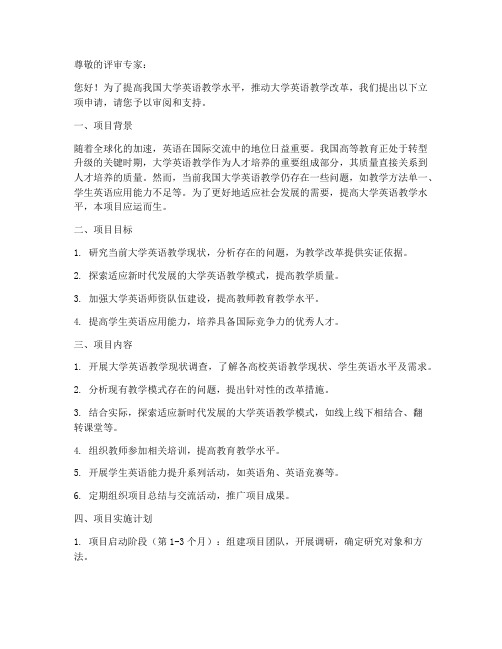
尊敬的评审专家:您好!为了提高我国大学英语教学水平,推动大学英语教学改革,我们提出以下立项申请,请您予以审阅和支持。
一、项目背景随着全球化的加速,英语在国际交流中的地位日益重要。
我国高等教育正处于转型升级的关键时期,大学英语教学作为人才培养的重要组成部分,其质量直接关系到人才培养的质量。
然而,当前我国大学英语教学仍存在一些问题,如教学方法单一、学生英语应用能力不足等。
为了更好地适应社会发展的需要,提高大学英语教学水平,本项目应运而生。
二、项目目标1. 研究当前大学英语教学现状,分析存在的问题,为教学改革提供实证依据。
2. 探索适应新时代发展的大学英语教学模式,提高教学质量。
3. 加强大学英语师资队伍建设,提高教师教育教学水平。
4. 提高学生英语应用能力,培养具备国际竞争力的优秀人才。
三、项目内容1. 开展大学英语教学现状调查,了解各高校英语教学现状、学生英语水平及需求。
2. 分析现有教学模式存在的问题,提出针对性的改革措施。
3. 结合实际,探索适应新时代发展的大学英语教学模式,如线上线下相结合、翻转课堂等。
4. 组织教师参加相关培训,提高教育教学水平。
5. 开展学生英语能力提升系列活动,如英语角、英语竞赛等。
6. 定期组织项目总结与交流活动,推广项目成果。
四、项目实施计划1. 项目启动阶段(第1-3个月):组建项目团队,开展调研,确定研究对象和方法。
2. 项目实施阶段(第4-8个月):开展教学现状调查,分析问题,探索教学模式,组织教师培训。
3. 项目推进阶段(第9-12个月):推广项目成果,开展学生英语能力提升活动,总结项目经验。
4. 项目总结阶段(第13-15个月):撰写项目总结报告,提交成果,进行项目评估。
五、项目预期成果1. 形成一套科学的大学英语教学现状分析报告。
2. 提出一套适应新时代发展的大学英语教学模式。
3. 提高一批大学英语教师的教育教学水平。
4. 提升学生的英语应用能力,培养更多具备国际竞争力的优秀人才。
英语课题立项申请书模板
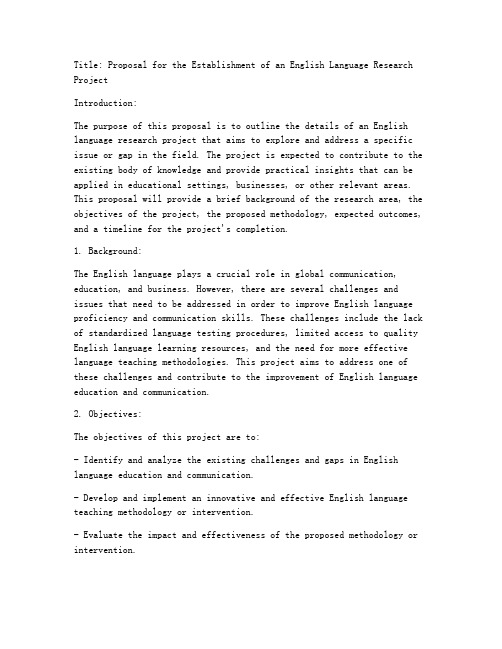
Title: Proposal for the Establishment of an English Language Research ProjectIntroduction:The purpose of this proposal is to outline the details of an English language research project that aims to explore and address a specific issue or gap in the field. The project is expected to contribute to the existing body of knowledge and provide practical insights that can be applied in educational settings, businesses, or other relevant areas. This proposal will provide a brief background of the research area, the objectives of the project, the proposed methodology, expected outcomes, and a timeline for the project's completion.1. Background:The English language plays a crucial role in global communication, education, and business. However, there are several challenges and issues that need to be addressed in order to improve English language proficiency and communication skills. These challenges include the lack of standardized language testing procedures, limited access to quality English language learning resources, and the need for more effective language teaching methodologies. This project aims to address one of these challenges and contribute to the improvement of English language education and communication.2. Objectives:The objectives of this project are to:- Identify and analyze the existing challenges and gaps in English language education and communication.- Develop and implement an innovative and effective English language teaching methodology or intervention.- Evaluate the impact and effectiveness of the proposed methodology or intervention.- Disseminate the findings of the project to relevant stakeholders and contribute to the existing body of knowledge.3. Proposed Methodology:The proposed methodology for this project will involve several steps, including:- Conducting a thorough literature review to identify the existing challenges and gaps in English language education and communication.- Developing and implementing an innovative and effective English language teaching methodology or intervention, based on the findings of the literature review.- Conducting empirical research to evaluate the impact and effectiveness of the proposed methodology or intervention.- Analyzing and interpreting the data collected during the research phase.- Disseminating the findings of the project through research papers, presentations, or other relevant means.4. Expected Outcomes:The expected outcomes of this project include:- A comprehensive understanding of the existing challenges and gaps in English language education and communication.- The development and implementation of an innovative and effective English language teaching methodology or intervention.- Empirical evidence on the impact and effectiveness of the proposed methodology or intervention.- A contribution to the existing body of knowledge in the field of English language education and communication.- Enhanced English language proficiency and communication skills among the target population.5. Timeline:The proposed timeline for the completion of this project is as follows:- Month 1-3: Conducting a thorough literature review and identifying the existing challenges and gaps in English language education and communication.- Month 4-6: Developing and implementing an innovative and effective English language teaching methodology or intervention.- Month 7-9: Conducting empirical research to evaluate the impact and effectiveness of the proposed methodology or intervention.- Month 10-12: Analyzing and interpreting the data collected during the research phase, and preparing research papers or presentations for dissemination.Conclusion:In conclusion, this project aims to contribute to the improvement of English language education and communication by addressing a specific challenge or gap in the field. The proposed methodology and timelinewill ensure the effective implementation and evaluation of the project, leading to meaningful outcomes that can be disseminated to relevant stakeholders. The successful completion of this project will provide valuable insights and practical solutions that can be applied in educational settings, businesses, or other relevant areas.。
高中英语课题立项申请书
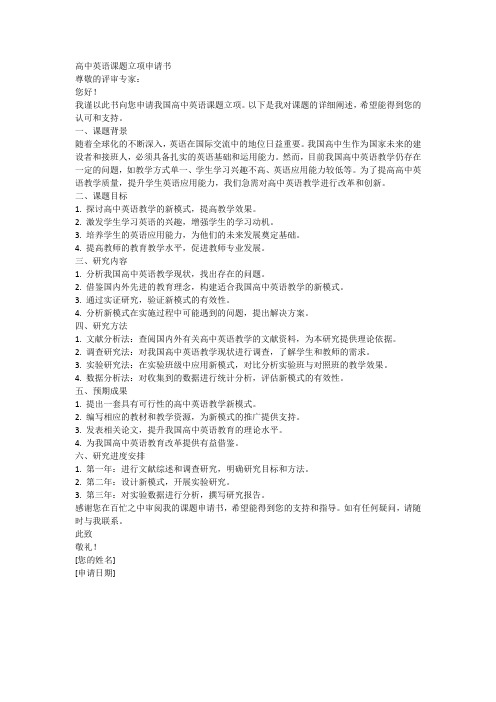
高中英语课题立项申请书尊敬的评审专家:您好!我谨以此书向您申请我国高中英语课题立项。
以下是我对课题的详细阐述,希望能得到您的认可和支持。
一、课题背景随着全球化的不断深入,英语在国际交流中的地位日益重要。
我国高中生作为国家未来的建设者和接班人,必须具备扎实的英语基础和运用能力。
然而,目前我国高中英语教学仍存在一定的问题,如教学方式单一、学生学习兴趣不高、英语应用能力较低等。
为了提高高中英语教学质量,提升学生英语应用能力,我们急需对高中英语教学进行改革和创新。
二、课题目标1. 探讨高中英语教学的新模式,提高教学效果。
2. 激发学生学习英语的兴趣,增强学生的学习动机。
3. 培养学生的英语应用能力,为他们的未来发展奠定基础。
4. 提高教师的教育教学水平,促进教师专业发展。
三、研究内容1. 分析我国高中英语教学现状,找出存在的问题。
2. 借鉴国内外先进的教育理念,构建适合我国高中英语教学的新模式。
3. 通过实证研究,验证新模式的有效性。
4. 分析新模式在实施过程中可能遇到的问题,提出解决方案。
四、研究方法1. 文献分析法:查阅国内外有关高中英语教学的文献资料,为本研究提供理论依据。
2. 调查研究法:对我国高中英语教学现状进行调查,了解学生和教师的需求。
3. 实验研究法:在实验班级中应用新模式,对比分析实验班与对照班的教学效果。
4. 数据分析法:对收集到的数据进行统计分析,评估新模式的有效性。
五、预期成果1. 提出一套具有可行性的高中英语教学新模式。
2. 编写相应的教材和教学资源,为新模式的推广提供支持。
3. 发表相关论文,提升我国高中英语教育的理论水平。
4. 为我国高中英语教育改革提供有益借鉴。
六、研究进度安排1. 第一年:进行文献综述和调查研究,明确研究目标和方法。
2. 第二年:设计新模式,开展实验研究。
3. 第三年:对实验数据进行分析,撰写研究报告。
感谢您在百忙之中审阅我的课题申请书,希望能得到您的支持和指导。
英语课题立项申请书范文
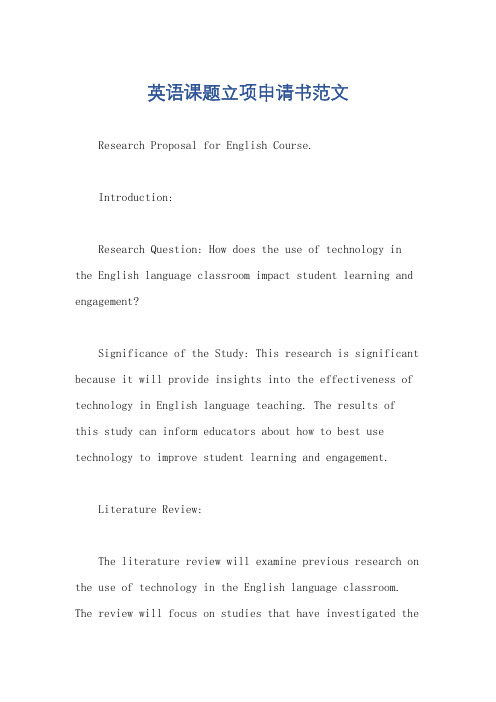
英语课题立项申请书范文Research Proposal for English Course.Introduction:Research Question: How does the use of technology in the English language classroom impact student learning and engagement?Significance of the Study: This research is significant because it will provide insights into the effectiveness of technology in English language teaching. The results ofthis study can inform educators about how to best use technology to improve student learning and engagement.Literature Review:The literature review will examine previous research on the use of technology in the English language classroom. The review will focus on studies that have investigated theimpact of technology on student learning, engagement, and motivation.Methodology:The research will use a mixed-methods approach. Quantitative data will be collected through surveys and questionnaires. Qualitative data will be collected through interviews and observations.Data Analysis:The quantitative data will be analyzed usingstatistical software. The qualitative data will be analyzed using thematic analysis.Expected Outcomes:The expected outcomes of this research are:1. A better understanding of the impact of technology on student learning and engagement in the English languageclassroom.2. Recommendations for how to best use technology inthe English language classroom.Timeline:The research will be conducted over a period of one year. The research will be completed by the end of May 2024.Budget:The budget for this research is $5,000. The budget will be used to cover the costs of data collection, data analysis, and dissemination of results.References:[1] Egbert, J., & Petrie, H. (2013). Technology in the language classroom: A literature review. Language Teaching Research, 17(2), 193-215.[2] Warschauer, M., & Matuchniak, T. (2010). New technologies and second language learning. Annual Review of Applied Linguistics, 30, 24-45.中文回答:研究课题申请书。
英语立项申请书经典模板
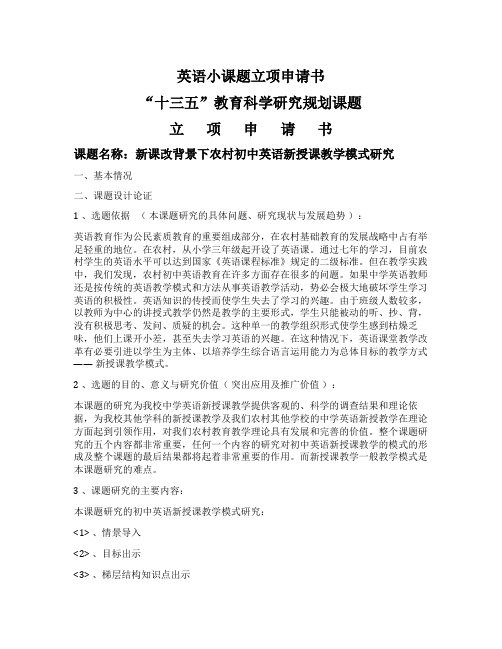
英语小课题立项申请书“十三五”教育科学研究规划课题立项申请书课题名称:新课改背景下农村初中英语新授课教学模式研究一、基本情况二、课题设计论证1 、选题依据(本课题研究的具体问题、研究现状与发展趋势):英语教育作为公民素质教育的重要组成部分,在农村基础教育的发展战略中占有举足轻重的地位。
在农村,从小学三年级起开设了英语课。
通过七年的学习,目前农村学生的英语水平可以达到国家《英语课程标准》规定的二级标准。
但在教学实践中,我们发现,农村初中英语教育在许多方面存在很多的问题。
如果中学英语教师还是按传统的英语教学模式和方法从事英语教学活动,势必会极大地破坏学生学习英语的积极性。
英语知识的传授而使学生失去了学习的兴趣。
由于班级人数较多,以教师为中心的讲授式教学仍然是教学的主要形式,学生只能被动的听、抄、背,没有积极思考、发问、质疑的机会。
这种单一的教学组织形式使学生感到枯燥乏味,他们上课开小差,甚至失去学习英语的兴趣。
在这种情况下,英语课堂教学改革有必要引进以学生为主体、以培养学生综合语言运用能力为总体目标的教学方式——新授课教学模式。
2 、选题的目的、意义与研究价值(突出应用及推广价值):本课题的研究为我校中学英语新授课教学提供客观的、科学的调查结果和理论依据,为我校其他学科的新授课教学及我们农村其他学校的中学英语新授教学在理论方面起到引领作用,对我们农村教育教学理论具有发展和完善的价值。
整个课题研究的五个内容都非常重要,任何一个内容的研究对初中英语新授课教学的模式的形成及整个课题的最后结果都将起着非常重要的作用。
而新授课教学一般教学模式是本课题研究的难点。
3 、课题研究的主要内容:本课题研究的初中英语新授课教学模式研究:<1> 、情景导入<2> 、目标出示<3> 、梯层结构知识点出示<4> 、知识内化阶段<5> 、语言升华阶段4 、课题研究方法:文献研究法:实施本课题的理论支撑点以及方法论依据的研究实践法:方法论的探索以及运用的研究经验总结法:完善方法论及策略的研究系统论方法:摸索并建立起一套任务型教学一般教学模式的研究个案研究法:实时监控学生个体的成长和发展。
课题立项申请书参考教师

尊敬的评审专家:您好!我是来自XX学校的一名教师,在此向您提交我的课题立项申请书。
我希望通过开展“关于提高小学生英语学习兴趣的研究”这一课题,为我国英语教育改革贡献一份力量。
一、课题背景及意义随着全球化的加速,英语在国际交流中的地位日益凸显。
在我国,英语作为一门重要的学科,其重要性不言而喻。
然而,长期以来,我国英语教育存在一些问题,如过分注重应试、忽视学生兴趣培养等。
这导致许多学生对英语学习缺乏兴趣,甚至产生厌学情绪。
据调查,我国有小学生在英语学习中存在以下问题:1. 英语学习兴趣不高,学习积极性较低;2. 英语学习方法不当,导致学习效果不佳;3. 英语教师教学方式单一,缺乏吸引力。
针对这些问题,本课题旨在研究如何提高小学生英语学习兴趣,从而提高英语教育质量。
二、研究目标1. 分析当前小学生英语学习兴趣低的原因;2. 探索有效提高小学生英语学习兴趣的方法和策略;3. 为英语教师提供有针对性的教学建议。
三、研究方法1. 文献法:通过查阅国内外相关研究资料,了解小学生英语学习兴趣的现状、成因及对策;2. 问卷调查法:对小学生进行问卷调查,了解他们的英语学习兴趣、学习方法等情况;3. 实证研究法:在实际教学中运用提高英语学习兴趣的方法和策略,观察学生的学习效果;4. 访谈法:与英语教师进行访谈,了解他们在教学中的困难和对提高学生英语学习兴趣的需求。
四、研究阶段1. 第一阶段:查阅文献,确定研究框架,设计问卷调查表;2. 第二阶段:开展问卷调查,收集数据,进行分析;3. 第三阶段:根据调查结果,提出提高小学生英语学习兴趣的方法和策略;4. 第四阶段:在实际教学中应用研究成果,观察学生学习效果,对方法和策略进行优化;5. 第五阶段:撰写研究报告,提出建议。
五、预期成果1. 揭示当前小学生英语学习兴趣低的原因;2. 形成一套有效提高小学生英语学习兴趣的方法和策略;3. 为英语教师提供有针对性的教学建议,提高教学质量;4. 发表相关论文,推广研究成果。
- 1、下载文档前请自行甄别文档内容的完整性,平台不提供额外的编辑、内容补充、找答案等附加服务。
- 2、"仅部分预览"的文档,不可在线预览部分如存在完整性等问题,可反馈申请退款(可完整预览的文档不适用该条件!)。
- 3、如文档侵犯您的权益,请联系客服反馈,我们会尽快为您处理(人工客服工作时间:9:00-18:30)。
黑龙江省教育学会
“十三五”教育科学研究规划课题
立项申请书
课题编号
课题类别
研究领域
课题负责人
申请单位
通讯地址
邮政编码
申请日期
起止年月
说明
一、本申请书所列各项内容均需实事求是,认真填写。
对于课题研究的目的、意义、内容和方法等项目,填写要突出重点、明确严谨、简明扼要。
对课题的预期成果要贴切,体现价值。
二、上报的《课题立项申请书》一式3份,用作省、市教育学会和课题组存档。
三、每项课题负责人不得超过3位,每位负责人限申报一项课题。
每项课题参研人员不得超过30人。
四、此表必须由课题依托学校(专业委员会)负责人签章,并加盖学校(专业委员会)公章。
五、课题研究时限以批准日期为准,研究过程不能低于两年,一般不超过5年。
六、重点课题负责人,一般中学应具有高级专业技术职称、小学应具有中级以上专业技术职称、县(市、区)教育领域的学科带头人及各级教育部门有多年教育行政、业务管理经验的干部。
特殊情况的负责人要在单位审批意见中加以说明。
一、课题研究人员
二、课题设计论证
三、课题负责人近5年取得的与本课题有关的主要研究成果
四、课题所在单位意见
五、市教育学会意见
六、省教育学会学术委员会评审意见。
